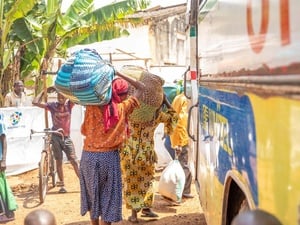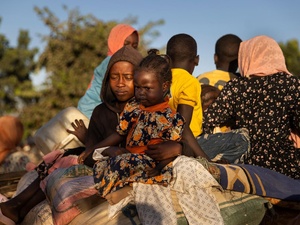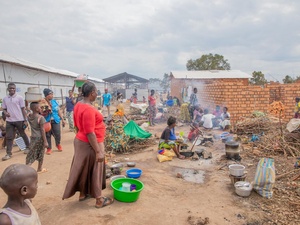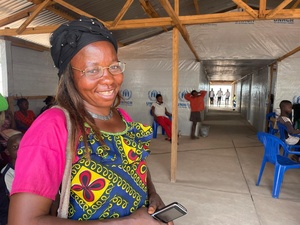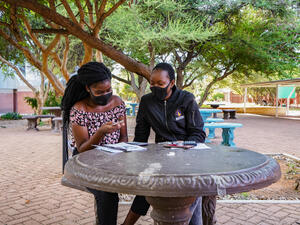Model refugee will be missed upon return to Angola, say aid workers
Model refugee will be missed upon return to Angola, say aid workers
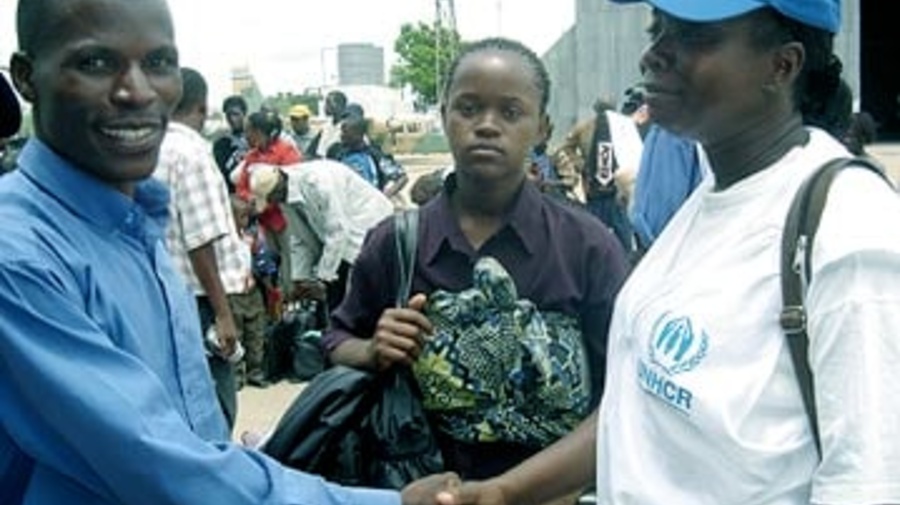
Angolan refugee Xavier Pio and his family bid farewell to aid worker Lisa Palmer in Botswana.
DUKWI REFUGEE CAMP, Botswana (UNHCR) - It is only 6 a.m. in Botswana's Dukwi refugee camp and already, it promises to be another scorching day. But the 62 Angolan refugees, the first group to be leaving Botswana this year under the organised voluntary repatriation programme currently underway in southern Africa, are too excited to feel its sapping effects.
It is December 3. The bus transporting them from the camp to Francistown Airport waits patiently as they scurry about restraining straying children and taking leave of family and friends who will only leave Botswana in 2005. This group of refugees is being airlifted to Huambo, central Angola, from where they will be transported onwards to their areas of origin in the Huambo, Bie and Benguela provinces.
Xavier Pio, the camp's Portuguese teacher, is among this group. He has waited a long time for this day. "It's unbelievable to think that today I will be in my motherland!" he enthuses.
Not only will he be home by the end of the day, but Pio and his fellow returnees will also be seeing an Angola that is at peace, something that for a long time was very difficult to imagine.
Pio arrived in Botswana on December 16, 1998 after fleeing the civil war in Angola. He had already completed his secondary education in 1993, but the political turmoil and danger posed on his life prevented him from furthering his studies there.
He had no choice but to redo three years of his secondary education in Dukwi camp's school, the Educational Resource Centre, with the hope that he would qualify to start an undergraduate degree at the University of Botswana. When this failed to materialise, Pio turned his optimism and boundless energy to income-generating initiatives and awareness-raising activities in the camp.
"Pio is a very industrious person," smiles Father Benjamin Moleko of the Botswana Council of Churches, UNHCR's implementing partner. "He has worn so many hats in his functions in the camp, sometimes I wonder what we are going to do without him, now that he is leaving."
One of these functions involved helping out on the information campaign on repatriation. Pio was employed as the camp's Portuguese teacher in order to provide basic language lessons to many of the potential returnees and their children who have lived in Botswana all their lives.
"In this way, we are equipping the returnees with basic Portuguese so that they are able to talk to each other and to avoid being discriminated against for not speaking Angola's national language," adds Moleko.
Before he became the Portuguese teacher, Pio ran a small tailoring business in Gaborone, Botswana's capital. An avid songwriter and member of the Dukwi Refugee Band, he has also written the lyrics for many songs with socially conscious messages, ranging from HIV/AIDS awareness to encouraging his fellow Angolans to consider returning home.
"Let's go home now, the country has been destroyed.
Let's go now and rebuild our country,
We are the youth and it is our responsibility ... "
Sung in his native Bukushu, the song really got people thinking, says community services officer Lisa Palmer.
"Pio has great expectations of Angola and he sees the youth as instrumental in bringing the future of their country into being," notes Palmer. "His excitement at returning home is very infectious and I would certainly think that his song has contributed towards encouraging the refugees to make their choice."
"Pio and the band have done a great job in raising awareness of the social ills of the camp through their music and they have supported UNHCR's public awareness initiatives throughout," she adds.
Pio believes that there is much to do in Angola to bring it back to its former glory and make it an even better country than what the old folks remember it to be.
"Our elders in the camp have fed us a steady diet of stories about Angola's heyday - what it looked like before the war, the rainfalls they had, the abundant agricultural produce - it sounds like heaven on earth!" he says.
The elders' ploy to ensure that their children never forget their motherland, through the age-old tradition of storytelling, has worked on Pio. "Nothing can stop me from returning home!"
While happy for Pio and his countrymen, the camp's administrators are quite saddened by his departure.
"I truly enjoyed working with him," says Father Moleko. "He is a hardworking fellow, with the interests of his community at heart. He has definitely used his skills towards bettering the lives of his people - the sort of personality who will contribute much to rebuilding his country and immediate community. He'll be very instrumental at this as he has the right attitude towards his people and his work!"
Palmer couldn't agree more. "While I am happy for this first group that is leaving, Xavier's departure is indeed a big loss for the school and camp, the youth and our office. He has been so very helpful! You'd knock on his door at all hours of the day and if he could, he'd extend his assistance without a second thought."
When Pio hears these remarks, his eyes glisten with unshed tears. He is touched by the high regard in which he is held.
"On behalf of Angola's refugees here, I'd like to say to the Botswana government and the people who helped facilitate our protection, we are really grateful. As people who had been traumatised by war, we have lived peacefully here. We are now going home safely. Thank you Botswana and UNHCR," he says.
As Pio and his family board the homeward bound aircraft, everyone agrees that his departure will be a definite gain for Angola.
By Pumla Rulashe in Botswana and Angola


